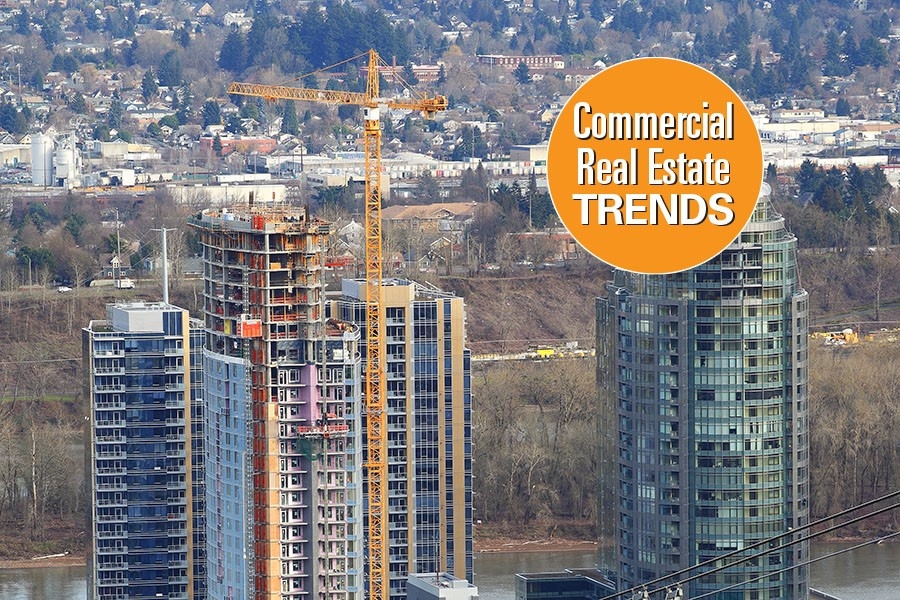A report shows confidence is high in the real estate market despite talk of recession.
Looking up at the glittering skyline, it’s plain to see just how much commercial real estate and construction has transformed Oregon and Southwest Washington.
Partnering with Portland marketing agency Kinesis, law firm Schwabe, Williamson and Wyatt published a forward-looking study this fall, ‘Commercial Real Estate & Construction in the Pacific Northwest,’ which took the temperature of the 2019 commercial real estate and construction climate.
More than 700 industry executives responded to the survey, which asked questions about their projections, concerns and hopes for the coming year. The study surveyed a wide variety of commercial real estate and construction employees, half of whom held leadership roles in their organizations.
Additionally, the study accounted for businesses of varying sizes. Twenty-five percent of businesses surveyed generated less than $1 million in revenue, while 23% generated more than $100 million annually.
So what exactly did the survey find? Here are five takeaways.
1. Confidence in the market is high.
“What we heard from our participants is that there is a general confidence in the real estate and construction market in the Pacific Northwest, despite the fact that people keep talking about a market shift or correction,” says Stephanie Holmberg, leader of Schwabe’s real estate and construction industry group.
Seventy-two percent of commercial real estate business respondents reported high confidence for their annual outlook, as did 71% of construction respondents. Only 1% and 2% respectively said they were not confident about business for the upcoming year.
Most respondents said the high degree of confidence was attributed to the strength of the local economy.
But…
2. Folks are preparing for a potential downturn.
Holmberg says business proprietors are “looking around the corner” to prepare themselves for a potential recession. For now the commercial real estate and
construction outlook is cautiously optimistic, but businesses have been looking into ways to prepare should a downturn be on the horizon.
Environmental regulations and immigration pressures were among the top concerns facing leaders in the industry.
The report found that Oregon and Southwest Washington had the strictest environmental laws in the nation. Furthermore, fear of increased immigration policing has made it more difficult for employers to find, hire and retain workers for fear of workplace raids.
To prepare for potential headwinds, 19% of respondents reported their company was diversifying clients and projects to secure a wider range of business. Fifteen percent reported hiring freezes or layoffs, although 58% reported they were looking to hire more employees.
Despite the caution, a mere 3% of companies said they were increasing their marketing efforts.
3. Technology and innovation are driving commercial real estate and construction.
The report found most construction businesses employ mobile apps. Seventy-five percent of respondents said they already use mobile apps on their jobs sites, with another 11% saying they plan to do so in the future.
The use of innovative building materials and predicative analytics were not as widely used. But of the firms that didn’t use them, more than 20% said they plan to use newer building materials and prediction analytics software in the future.
4. The industry is diversifying.
Twenty-five percent of businesses taking part in the survey were women and/or minority-owned.
Furthermore, one half of respondents reported difficulties finding and recruiting new talent in a tight labor market. Twenty percent of respondents said having a diverse workforce was a “high priority.”
5. New industries have made certain kinds of construction less viable.
Confident as the economic outlook may be, there are certain kinds of construction that are not thriving like they ought to be in a healthy economy. While half of respondents said they will be working on infrastructure, private-public partnerships and affordable housing, certain construction projects decreased.
Twenty-five percent of respondents said they would be working on fewer amusement, retail and hotel projects in the coming year.
Holmberg says the rise of new technologies like Amazon.com and Airbnb might make those kinds of construction projects less viable. The rise of streaming services like Netflix and Disney+ could help explain the decline in amusement constructions as well.
To subscribe to Oregon Business, click here.




